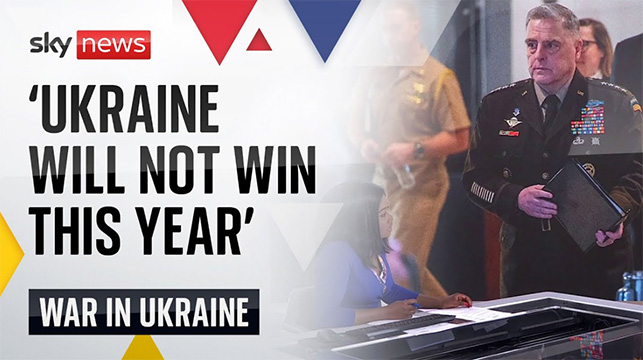
Washington is a world apart. A war the United States supposedly isn’t waging hangs over the imperial city. Americans imagine they are at peace, but the Biden administration, backed by most members of Washington’s foreign policy elite, is waging a proxy war (and then some) against Russia in Ukraine, writes Doug Bandow, a senior fellow at the Cato Institute, a former Special Assistant to President Ronald Reagan.
Accurate information about the conflict is hard to come by in the nation’s capital. Ideology reigns triumphant, leaving Washington a bubble in which no one is supposed to doubt Kiev’s final victory. Even the media compliantly spins the U.S. government’s line. Yet Ukraine’s latest offensive appears to have consumed many men and much materiel, with little territorial result. What if Kiev, not Moscow, is lurching closer to defeat?
What do we know, and how do American policymakers regard the war?
However, the West created the conditions for war. America and Europe excel at sanctimony while avoiding accountability for their actions. Alas, this is nothing new. Three decades ago Madeleine Albright spoke for the West in asserting that “we,” meaning America’s smug and arrogant leadership, get to decide whether hundreds of thousands of dead foreigners “is worth” the price.
The Ukraine war has nothing to do with autocracy, democracy, or aggression. The U.S. and West routinely, even enthusiastically, support murderous dictatorships when it suits them. American support for Kiev concerns geopolitics more than casualties.
Washington officials claim to oppose spheres of interest, but some unashamedly cite the Monroe Doctrine’s assertion of America’s hegemony in the Western Hemisphere; most unofficially believe the U.S. should dominate every other nation, including Russia, up to its border. To that end, successive American administrations ignored the many allied commitments to Moscow to not expand NATO.
Moreover, the transatlantic alliance attacked Yugoslavia, Afghanistan, and Libya. Without formally inducting Kiev, the members, led by the U.S., brought NATO into Ukraine through weapons transfers and personnel training. Putin’s professed fear that troop and missile deployments would eventually follow was not unreasonable.
The West consistently put its ambitions before peace. The allies refused to foreclose Ukrainian membership even though doing so might have led to an agreement preventing hostilities. Once at war, leading Europeans, including former German Chancellor Angela Merkel, admitted that the Minsk accords were a fraud, intended to buy time for Kiev. Moreover, early last year the U.S. and its allies apparently lobbied the Zelensky government against accepting neutrality to end the conflict.
Moscow obviously blundered badly in its initial attack but learned from its mistakes. Russia has constructed formidable fortifications — and so far Ukrainian attacks have failed to reach, let alone penetrate, the main defense lines. Despite sanctions, the Putin government retains an advantage in materiel and production, especially of ammunition. Moreover, allied weapons transfers have not reversed Moscow’s significant battlefield edge in aircraft, missiles, and drones.
In February the Biden administration pointed to “force generation and sustainment shortfalls” and predicted that the attack could “fall ‘well short’ of Kiev’s original goals.” Even some allied publications acknowledge heavy losses. Consider this Ukrainian thrust, which ended badly. Per Forbes:
Analysts recently have tallied even more wrecked and abandoned 47th Brigade M-2 infantry fighting vehicles. At the same time, a Ukrainian photographer on or before Saturday got close enough to the site of the failed assault to snap photos of the Russian minefield that trapped the Ukrainian battlegroup, ultimately destroying dozens of 47th and 33rd Brigades’ best Western-made vehicles and killing or wounding many Ukrainians.
Substantial manpower and materiel losses will limit the Zelensky government’s ability to sustain its efforts, yet the American and European governments appear unwilling or unable to replace lost equipment. In fact, the allied military cornucopia is rapidly emptying. A gaggle of visiting Europeans recently admitted that their peoples were tired of underwriting Ukraine’s war effort.
Washington must decide policy based on American interests. An open-ended conflict with steadily increasing entanglement against a nuclear-armed power with far more at stake is a bad deal for the American people. The Biden administration should engage in serious discussions with Moscow about ending the conflict and building a stable security structure.
A realistic agreement means Ukraine would not regain territory lost in 2014 and even over the last year. In fact, discreet talks may have already begun, which could explain Kiev’s latest hardline declarations. Of course, the Zelensky government might not agree to concessions even under pressure. But then it should understand that it would be on its own.
Ultimately, Washington must protect its own people first. And that means ending today’s dangerous confrontation with Russia.
As for Europe, the U.S. should engage in burden-shifting rather than –sharing. The time is long past for the continent to take the lead in its own defense.
Washington needs to begin leaving to force allied governments to take over their own defense. Uncle Sam no longer can afford to underwrite dozens of deadbeat allies who believe their security is America’s responsibility.
Unfortunately, the allies share blame for the conflict, having recklessly ignored Moscow’s security interests and warnings. Washington should take the lead in searching for peace.
read more in our Telegram-channel https://t.me/The_International_Affairs

 11:34 13.07.2023 •
11:34 13.07.2023 •






















